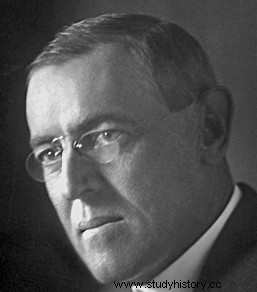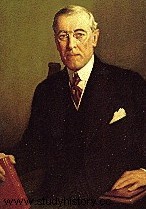It may be said that the 26th Theodore Roosevelt is the most likely president of the United States, while the 28th Woodrow Wilson is the least likely president of the United States.
Thomas Woodrow Wilson is the president who founded the League of Nations from the experience of World War I and loved peace from the bottom of his heart.
Wilson before becoming president
Woodrow Wilson was born in Virginia in 1856 as a child of his father Joseph Ruggles Wilson (born in Ohio) with a PhD. He is the first president from Virginia after the Civil War.
His father and grandfather are devout Calvin Christians, and his father is also the founder of the Presbyterian Church in the United States. His mother's father was also a scholar, and Wilson may have been a born scholar in a sense.
However, Wilson was born with LD (learning disability), and he was unable to write letters as dyslexia. Still, he graduated from Princeton University in 1789 and then studied law at the University of Virginia for a year.
After that, he worked as a lawyer in Atlanta, Georgia in the south, and after working for about a year, he got a PhD from John Hopkins University.
Woodrow Wilson is the only president to have a PhD before taking office until 2019.
He began teaching at his alma mater, Princeton University, in 1890, becoming president in 1892 and then until 1910.
In 1910, when he was nominated by the Democratic Party and became governor of New Jersey, he ran as a candidate for the Democratic Party in the 1912 presidential election. Two of Theodore Roosevelt ran for the race, and the votes were broken. When I opened it, Wilson became president.
28th President of the United States

Wilson's presidency was a time when the world was in a state of turmoil.
In the Americas, during the Mexican Revolution that began in 1913, Wilson intervened here but withdrew with a backlash and sent to Haiti in 1915. These are basically said to have inherited American imperialism since Theodore Roosevelt, and Wilson's diplomacy is said to be missionary diplomacy, as opposed to Theodore's diplomacy and Taft's dollar diplomacy.
In 1914, World War I broke out on the European continent. The United States initially decided not to participate according to Monroe Doctrine.
However, there are high voices that the United States, including Theodore Roosevelt, should also participate, and when the Lusitania incident due to the unlimited bombing of Germany occurs, the United States also participated in World War I on the commercial side in 1917 without going against public opinion. It was decided to do.
At this time, Wilson called World War I "a battle to protect peace, democracy, and human rights," and set out the principle of self-determination and began to face the war. This will gradually damage the Ottoman and British Empires, which have a large number of ethnic groups on his territory.
Under such circumstances, the Russian Revolution broke out under the leadership of Lenin, Russia left the front line from World War I, Romanov Emperor Romanov II was executed, and the Soviet Union, the first socialist state in history, was born. become.
Wilson threatens the spread of socialism and faces the world with " 14 Peace Principles Was announced as a check on socialism.
The contents of the 14 clauses are as follows.
- Disclosure of peace negotiations and abolition of secret diplomacy
- Freedom of the sea (public sea)
- Elimination of tariff barriers (establishment of equal trade relations)
- Disarmament
- Fair treatment of the colony
- Withdrawal from Russia and free choice of Russian regime
- Restoration of Sovereignty in Belgium
- Return of Alsace-Lorraine to France
- Readjustment of the Italian border
- Ethnic autonomy within the Austro-Hungarian Empire
- Guarantee of independence of Balkan countries
- Guarantee of the autonomy of the people under Turkish rule
- Polish independence
- Establishment of International Peace Organization
However, despite announcing such content, Wilson Siberian intervention to Russia. And attacked the Soviet government with Britain, France and Japan.
After World War I, a peace conference was held in Paris. Wilson also attended the meeting and suggested refraining from harsh sanctions on the defeated nations, but the British and French representatives would inadvertently impose the Treaty of Versailles on Germany, which would drive Germany to de facto destruction. ..
After that, the League of Nations was formed at Wilson's suggestion, but the United States, which respects Monroe Doctrine, did not participate in this, and the term ended as it was, and Woodrow Wilson died in 1924. He was 67 years old.
Personal evaluation of Woodrow Wilson

Woodrow Wilson was a president whose claims and actions did not match.
He always advocates a good idea, but it can be said that his truth is that there is a great contradiction with the idea.
Wilson himself would have seriously created the League of Nations, and he would have seriously created the 14 Peace Principles. But Wilson was not just a dreamer, for better or worse, but an excellent practitioner. Therefore, he did not force his ideals and there was no major turmoil in the country. On the contrary, through the First World War, the United States became a victorious nation, growing from a debt nation to a bond nation, and to become one of the leading Western powers.
Therefore, nothing is more difficult than the evaluation of Wilson.
He is close to 0 as an idealist, but no better president as a practitioner. He can be seen as a person who has an ideal but has a good compromise with reality.
On the other hand, he can be seen as a frustrated person who could not realize his ideal.
In a sense, it was a great success as a president, and it may be said that one individual had a dream. In terms of personality, Wilson is at a level comparable to Lincoln as president, and historically, there are few people with a personality like Wilson.
Woodrow Wilson was really a peace-loving president.
